At the presentation of Jossianna Arroyo’s book Writing Secrecy in Caribbean Freemasonry a strange question was brought up and it has had me thinking ever since. The question was, which Masonic texts show, represent, or reproduce concepts of coloniality? At first I could not come up with a satisfactory answer to the question, but then I realized that the issue I had with the question was that it revealed a lack of understanding about what an esoteric text is. Mostly likely the texts that this individual was asking about were not, in fact, esoteric because they are BOOKS. Books that are published and that you can buy and read. The true concept of what would be an esoteric text would not be a book at all. It would be an oral text, an esoteric ritual that is passed down to one as they are initiated into the various degrees of Freemasonry. Since coming to that conclusion I thought it may be important to explore, not which books you can buy that will show you how coloniality or colonial ideas are imbedded or transmitted through Freemasonry, but rather, to question how those concepts appear within the esoteric practices of Masonry itself. Since, strictly speaking, if it is in a books it isn’t esoteric. If you have read Jossianna’s book where she analyses the writings of Albert Pike and his dealings with Cassard and his ideas about race and authority and how he was attempting to extend North American authority and racial conceptions into Latin American or Indian Territories it is clear that there was a type of colonial ideology and even colonial practices that informed Pike’s Masonic leadership. But that is not within esoteric texts, that was within his writings and practices. So, the only way to directly approach how coloniality is reproduced in Freemasonry, in an esoteric sense, is to look at the content of the rituals. These degrees are intended to be kept secret but they can be found on the internet without much difficulty. On the other hand, many of the published texts of Freemasonry often expose incomplete or incorrect information. Duncan’s Ritual, for example, reveals entire degrees but there are small elements that are changed just enough to draw attention to someone who has only read the book and not been authentically initiated. Therefore, reading those texts is not enough to achieve the content or meaning of the degrees. That is where the truly esoteric comes into play.
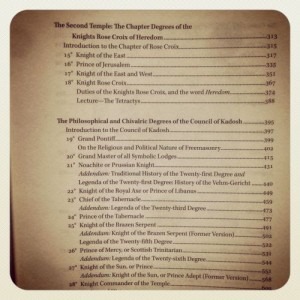
Before discussing specific degrees I would like to consider a more direct approach to the question of coloniality in Freemasonry. The organization of Freemasonry is explicitly colonial. If we take Anibal Quijano we can see how the processes of slavery and colonialism were the bases for modern society, industrialization, and urbanization. I think it is safe to say then that the rituals of Masonry were produced in a colonial atmosphere and context, and that they then reproduce colonial ideas being that they are a product that has been perpetuated through a colonial and neocolonial history all the way up to our current day. I think that it is impossible that they don’t reproduce those ideas. As much as we’d like to say, “Freemasonry is great,” the modernity that we entered into with the conquest and colonization of the Americas connects Masonry to the devastating lineage of coloniality. I think this is the simple answer as to how Freemasonry reproduces coloniality, because it is inevitably colonial. Especially being tied, as it was, to the aristocracy, and I think a lot of people take to Freemasonry because they feel it is a way to become associated with some older system, something aristocratic or noble. When the degrees talk about knights, knighthood, princes, and titles then it is fairly clear that there are non-democratic and colonial ideologies that are connected to them. Even though within the degrees there is resistance to those hierarchical concepts and those terms are being used in different ways, it is still possible that those titles are being interpreted by some in colonial ways. One of the important things about Freemasonry is that there is no dogmatic interpretation of the rituals. The way there are understood happens on an individual level. In that sense, whatever I may say is just my opinion and doesn’t need to bare any weight as to how people should interpret the degrees or why they should join Freemasonry in the first place. It is not my intention to criticize any individual for why they may choose to do it but I do think that there are misconceptions or misunderstandings about these terms and concepts.
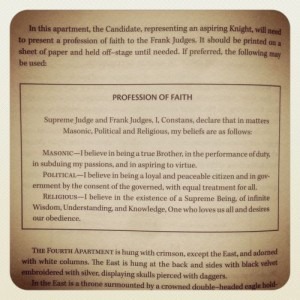
Now, to the practices that are imbedded within Freemasonry that could be read as colonial. To begin with the segregation within Freemasonry comes to mind. Where we have Prince Hall Masonry and what is called, unfortunately, “regular” Freemasonry separated from one another and in many areas not recognized by one another. Right away there is a colonial distinction between these two groups and who can be part of them that is based on race, which is central to colonial ideology. If we look to the degrees of the Scottish Rite we can also find many important teachings that are related to concepts of nationhood and justice that tend to perpetuate neocolonial conditions.
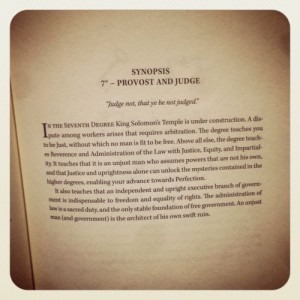
The 7th Degree: Provost and Judge. Here we have the degree in which several workers at the temple have a dispute about who can work there and who can be paid and they go to a judge to have the dispute settled. The judge gives a lesson about how one should not try to corrupt or influence justice. Part of the obligation of this degree is a commitment to defend the individual’s right to a trail by jury. Now, that’s not particularly strange to us now, but when these degrees were being developed and monarchies were being overthrown by revolutions this idea was very important. The teaching that you should be judged by your peers, by a jury, was a revolution against the monarch’s divine right to rule. As these concepts were presented through Freemasonry, presented to its initiates, and then manifested in the politics of these revolutionary nations (whose new leaders were often Freemasons) these ideas became part of these governments that later imposed their ideas of democracy or government or justice onto other countries in a neocolonial fashion.
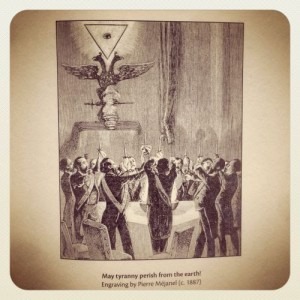
The 30th Degree: Knight Kadosh. This advanced degree teaches about the separation of church and state. An extensive apartment, or section, of this degree communicates the importance of the separation of church and state and the aspirants take obligations to protect this division of powers. Previously this degree taught this lesson with such impact that the aspirants trampled a cross and a crown, but since this practice has been changed for its problematic nature. While I personally believe that the separation of church and state are necessary, this concept has been embraced and developed by nations that via neocolonial practices exploit and influence other nations. These ideas are then perpetuated in other countries that must conform to North American or European standards of government structure. These concepts that can be found in Freemasonry appear within governments and are then forced upon other nations where they are unable to develop their own concepts of government of justice. When these concepts are not followed the neocolonial powers see other nations as threats and intervene in their sovereign affairs.
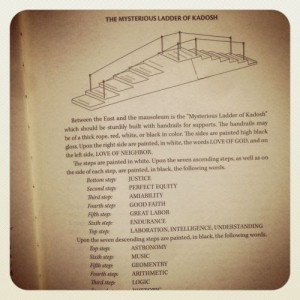
The previously mentioned Masonic teachings of justice and government can be seen as important and useful, especially in the context in which they were produced. These were secret concepts that members were taught as revolutions were happening and new governments were being established. The teachings were dangerous to preach publicly. The teachings of the Blue Lodge degrees were equally as dangerous. Those teachings about the Liberal Arts and Sciences were forward-thinking in their time. To us they seem rather mundane and that is because they have succeeded in becoming part of society and in becoming valued concepts. The problem is, is that these concepts have become part of a neocolonial structure that is imposed onto other nations that cannot then develop their own ideas without fear of reprisal. While Freemasonry spreads to these countries and becomes part of those nations, as much as they are worthwhile concepts, they are concepts that are being spread via pathways of colonial and neocolonial power. The other problem that arises is with the Masonic systems of charters and patents. In order to establish a lodge it has be authorized by another lodge or grand lodge. All these links of authority and recognition go back to colonial sources of power. So any establishment of lodges that don’t follow these paths of power, that don’t subjugate a group or nation to a history of power from another nation, are then seen as irregular or clandestine lodges.
These are some examples of how there are esoteric or ritual practices that become established in processes of neocolonial power. Freemasonry itself follows a path of colonial power and ideology. In light of all this I’d like to point out that one of the great values housed within Freemasonry is that none of those teachings are strictly prescribe to only one interpretation. So as we as individuals attempt to discover what there is within Freemasonry that can make us better and make our communities better, it is important that we don’t fall into colonial traps, fall prey to neocolonial ideologies that are going to keep us thinking along one route and that will rob us of our ability to play with the ideas taught in Masonry and to broaden their meanings. Part of the beauty of Freemasonry is it ambiguity and that is why it can be so varied and problematic, and powerfully subversive.
Cite This Article:
Cannon, Sam. «Esoteric Coloniality.» Pterodáctilo. Revista Pterodáctilo. 12 Dec. 2013. Web. [Date Article Accessed].
